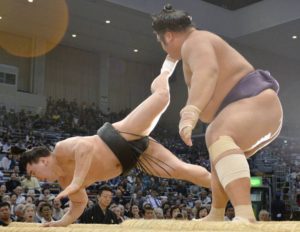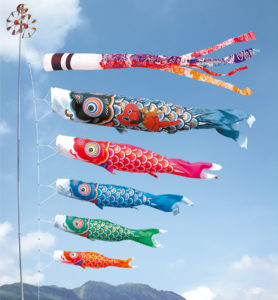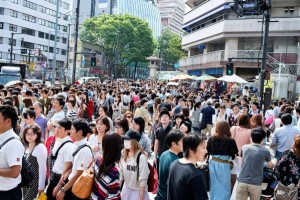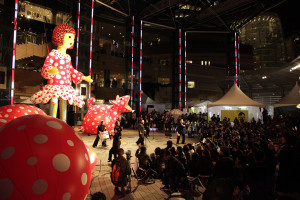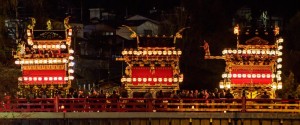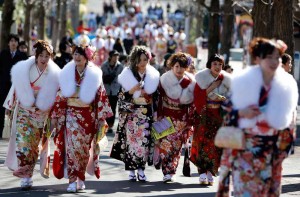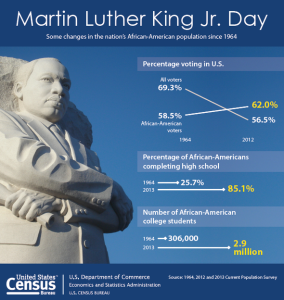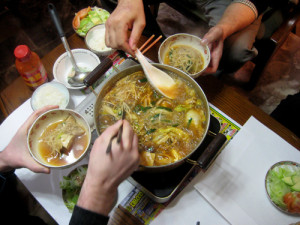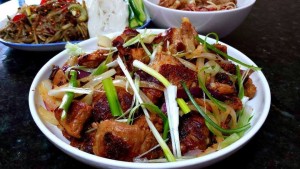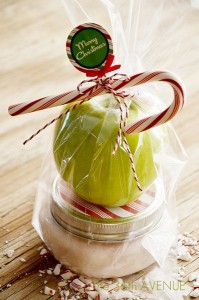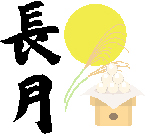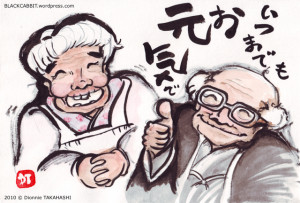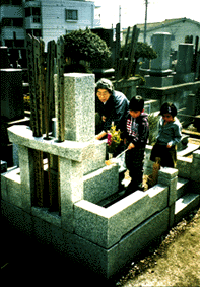- Set a budget to limit your spending on gifts.
- Make a list of all the people you are going to buy gifts for and the things you plan on buying.
- Differentiate wants from needs. “I want this, but do I need it?”
- Use coupons when applicable. There are coupons available through online websites, in your mails, and in stores.
Tag Archives: holiday
This Month in Japan | November
November in Japan is a popular time for people to visit parks, shrines, and gardens to witness the changing colors of the leaves. Also, it is a great time to travel to Japan due to the mild and cool weather. There are various events going on in Japan in which people can participate and have a fun time.
Some events being held in Japan during this month is:
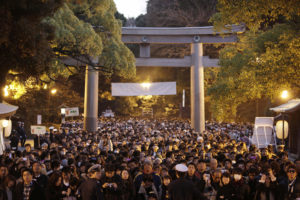
Crowds wait their turn to offer prayers at the Meiji Shrine in Tokyo, on the second day of the new year Saturday, Jan. 2, 2010. (AP Photo/Greg Baker)
- Meiji Shrine Autumn Festival is held at Meiji Shrine in the distrit of Harajuku from Nov 1-3, 2016. It includes a variety of art and sport performances.
- Kaki Season – “Kaki are an orange Japanese fruit that come into season in November. They are extremely bitter before they ripen. When ripe, they are sweet with a unique citrus-like taste. Kaki and kaki flavored desserts are widely available in Japan in late autumn.” – http://www.japan-talk.com
- Sumo Kyushu Basho is a sumo wrestling tournament that is being held from Nov 13-27, 2016. Click here for more info on the year schedule.
- Viewing of autumn leaves in public spaces, and a popular time for people to visit cities with wonderful views such as Kyoto, Sapporo, Tokyo, and more.
- Shrine, temples, and castle visits are also popular during this time of the year, usually from the fall into the winter and January of the next year for ceremonies, holidays, and receiving/giving blessings.
This Month in Japan | May
With the arrival of May, it signals the mass amount of holidays celebrated during this time. People can find that Japan is the most busiest time as everyone is trying to get to their destination and are going away for vacation. At the same time, it can be quite quiet in big cities like Tokyo as most people are not working and visiting other cities or relatives who lives further away. Here is what you need to know for the month of May in Japan:
- “Japan Golden Week is a collection of four national holidays that take place within a week including Showa Day celebrating Emperor Showa’s birthday; Constitution Day; Greenery Day, a national holiday dedicated to nature; and finally, Children’s Day with families praying for the health and success of their sons.” – http://www.onthegotours.com/
- Golden Week is in between April 29 to May 5. Make sure if you are planning to a trip to Japan during this time be aware that tourist spots, famous attractions, and traffic will be quite busy. During this time period is when many Japanese people take vacations and have time off work.
- Children’s Day is on May 5th and it celebrates the happiness, health, and personalities of children! A distinctive feature of this holiday in Japan are the carp-like kites which are used as decorations.
- The weather in May is probably one of the best time for people to enjoy nature and visit sites. It’s a period of when it is not too hot and before the arrival of the rainy season, so people are more likely to be outside from April to June.
- For more info & events of Japan in May, click here!
This Month in Japan | April
“Uzuki, the traditional name for April based on the lunar calendar, means “hare month.” It has been speculated that the name uzuki corresponds to the year of the rabbit in the Chinese zodiac.
For many years, the only national holiday this month was Greenery Day, on April 29. The 29th was the birthday of the late Emperor Showa so in 2007 Greenery Day was moved to May 4, and April 29 was renamed Showa no hi, or Showa Day.
https://www.gapyear.com/
Golden Week starts at the end of April in Japan (Showa Day [April 29], Constitution Day [May 3], Greenery Day [May 4], Children’s Day [May 5]). It is common for businesses to give their employees the whole week off, making it a busy time for travel among the Japanese people.” – Credits belong to rightful owner
Other fun facts:
- The sakura season began in March and continue towards the end of April. Visitors still have time to enjoy the cherry blossoms at local parks and gardens across Japan.
- Roppongi Art Night is a free event that allows people and tourists to view amazing art collections in the neighborhood of Roppongi. It is an event held from 10AM throughout the night. “Galleries that will stay open throughout the night: Roppongi Hills, Mori Art Museum, Tokyo Midtown, Suntory Museum of Art, 21_21 DESIGN SIGHT, The National Art Center, Tokyo.” – http://www.tokyo-top-guide.com/
http://www.tokyoweekender.com/
- Earth Day (April 23-24) is celebrated in Japan through a event hosted at Yoyogi Park. It’s an opportunity for organizations to present their causes to the public and allows people to become informed of other environmental issues. Other features of this event are foods, performances, and music.
- The 2016 Takayama Spring Festival is held on April 14-15 and it’s located in the town of Takayama. It’s known to host antique floats that are uniquely designed and decorated with lanterns. For more detail on the event, click here!
http://incrediblephototours.com/
This Month in Japan | January
“The old name for the month of January, Mutsuki, means “month of harmony” or “month where friends and relatives gather.”
One of the most important national holidays in Japan is Oshogatsu (New Year’s Day). Schools are typically closed for about 2 weeks, and many business are closed from December 28 through January 1. Read 14 Ways to Have a Happy New Year in Japan.
Coming-of-Age Day, observed on the second Monday of January, is another national holiday this month. On this day, women often wear an elaborate style of kimono called furisode while men typically wear formal suits to celebrate being 20-years-old, the age of adulthood in Japan.” – Rightful owner
Here are some fun things that occur in this month:
- “Wakakusa Yamayaki – January 23, Nara
Centuries ago there was a land dispute between Kofukuji and Todaiji temples in Nara. As part of the dispute someone ended up burning down Mount Wakakusa. Now they do it every year as part of the Wakakusa Yamayaki Festival.” – http://www.japan-talk.com/
- There’s a ton of festivals that features snow/ice art in the cold season of Japan. They are visited by people who comes to visit the beautiful sceneries.
- Although it is the coldest month of the year, this is the time where the sun shines the most. This allows people to enjoy outdoor activities even more!
- This is the month that signifies the beginning of a new year and that means that many people will come visit shrines to pray.
Happy Martin Luther King Day!
In celebration of Martin Luther King day, let’s highlight some of the accomplishments from the African American community and other fun facts!
- On November 2, 1983, the bill for Martin Luther King day was signed by President Ronald Reagan.
- Michael Curry became the the first Black leader of Episcopal church in June of 2015.
- “The poverty rate among blacks is the highest of any racial or ethnic group, but has declined slightly over time, from 31.3% in 1976 to 27.2% in 2014, according to census data.” – http://www.pewresearch.org/
- Here are some ways to reflect on this day:
- Think about yourself in place of other people who are different from you.
- Become part of or be a supporter of a positive change! Whether it is in politics, activism, or a cause that you believe in.
- Open your eyes and ears! Start to take notice of the injustice around the world and think about what you can do to serve others.
For more info, click on the link here.
Avoid Identity Theft
Have you been doing lots of shopping this holiday? You probably aren’t worried about having your identity stolen, but you should still try to be aware of it. Why? According to the https://www.ncjrs.gov/, the majority of identity theft victims (86%) experienced the fraudulent use of existing account information, such as credit card or bank account information. Most likely you are using a card during your shopping trips. That’s it is important for you to be reminded of a few things when you are shopping this holiday.
Here are some tips on how to avoid identity theft:
- Avoid scams online and in person! Websites that starts out with the “https” will tell you that they are actual online shops. So don’t buy in on spam emails that say they are from your favorite stores. Also, the common knowledge is to avoid buying anything from people who are randomly selling products because you never know where it is from and what it is.
- Keep track of all of your spendings! Most importantly, keep track of your credit cards and debit card. If you notice that there is money being taken out of your card, contact your bank or credit card immediately.
- “Under federal law, your liability for unauthorized use of your credit card tops out at $50. If you report the loss of your credit card before someone else uses it, you are not responsible for any charges you didn’t authorize. If your credit card number is stolen, but not the card, you are not liable for unauthorized use.” – http://mn.gov/commerce/
- For debit cards, it is your liability to report it as soon as possible as money is being directly taken out from your account.
- Make sure that you buy things online buy it through Paypal or create an account with the stores so that your financial information is secured. If not, it is best to go directly to the store then clicking on a unknown link.
This Month in Japan | December
“Shiwasu, the traditional name for December, refers to teachers or priests rushing around hastily. This is because the teachers and priests at temples or shrines are busy preparing and cleaning for upcoming New Year celebrations.
The Emperor’s birthday, December 23, is the primary national holiday in Japan this month. His birthday is one of the only two occasions per year when the Imperial Grounds are open to the public. The end of year holidays on December 29, 30 and 31 that continue into the beginning of January (1-3) are also official national holidays for the purpose of enjoying the end of the year.
Bonenkai parties (or “year forgetting parties”) are often held in December with companies, organizations, families, and friends to forget the troubles and worries of the year.” – Rightful owner
Fun facts & info:
Photo credit belongs to http://kelly.cybr.org/
- Nabe is a popular dish to eat during the cold season! What is it? It’s Japanese hotpot and usually, there is a group of people eating the food that’s cooked on a pot with a gas burner. It is a great way for people to bond through eating!
- Hotsprings or onsen, are a popular attraction year round, but even more so during the colder season. It is a public bathing house and can be indoors or outdoors. It is a great way to relax the body!
- December is a popular month for people to visit shrines and temples as it is coming close to the New Year! People gather around from all over the country to pray and ask their wishes to come true.
- There will be tons of festivals occurring happening all over in Japan! Just to name some, Fukugonji Fire Festival, Akou Gishisa, & Sanpoji Daikon Festival. Here is a link for more info!
Great Resources & Tips for the Holiday!
The holiday season is here and that means that there is going to be lots of family and friend gatherings accompanied by presents, music, and delicious foods. And remember to take care of yourself so that you can be in your best shape for the holiday! So forget to check out these resources down below for helpful information and fun tips:
- The 12 Ways to Health Holiday Song was created by CDC and it’s a song about keep yourself safe and healthy for this holiday!
- Want to try out new recipes for the holidays? Check out this link for recipes of Korean food! Or how about Hmong food recipes? And, you don’t have to choose from the links posted here as there are various websites you can choose from.
- An alternative to hot drinks like coffee and hot chocolate is tea! Tea is a much healthier alternative with less calories and sugar. Bonus: the variety of tea available on the market is tremendous so you’ll probably find something that suits your taste. Also, you can always add ice, sugar, and mix it with other tea leaves if you want to.
- Want to give gifts on a budget? If you’re on a budget, it’s still possible to give great gifts as long as they’re meaningful. Check out this link here for 101+ diy gift ideas and YouTube for creative and fun ideas!
- Good habits will help keep you healthy! If you may have not already know, good habits can stop germs from making you sick. Here is a informative article with tips to help you out: Preventing the Flu: Good Health Habits Can Help Stop Germs!
This Month in Japan | September
Nagatsuki is the shortened form of Yonagazuki, meaning “long-night month” for what is today the month of September. Tsukimi or “Moon-viewing” parties are popular today but originally began in the Heian Era (794-1185 CE) to honor harvests and the beauty of the moon. At tsukimi celebrations, many feast on dumplings and celebrate the coming of autumn.
This month, two national holidays including Keiro no hi, or Respect for the Aged Day, and Autumnal Equinox Day are observed.
https://blackcabbit.wordpress.com/
Respect for Aged day is celebrated on the 3rd Monday in September and is one of many Japan’s national holidays. It’s a holiday that is spent respecting, honoring, and giving gifts to the elders. It highlights the longevity of Japan’s elderly population.
“With improvements in healthcare, Japanese people are living longer than ever and the number of people over the age of 100 is expected to reach 32,000 next month.
One in five Japanese are aged 65 or older and Japanese women can expect to live to see their 85th birthday.” – http://www.officeholidays.com/
Autumnal Equinox Day usually falls on Sept 22 or 23. It is a period of time where Japanese people pay respects to their ancestors, elders, and important family members. Also, it marks the day that daylight will be getting shorter as winter approach.
“The Japanese have traditionally called the period around the autumnal and vernal (springtime) equinoxes higan. There’s a saying that goes, “both the heat and cold end with higan.” Higan lasts for seven days – beginning three days prior to the equinox and ending three days after it. It occurs twice a year, once when the blustery winter temperatures give way to spring and again when the heat subsides and the cool, crisp air of autumn arrives.
Higan has Buddhist origins. It means the “other side of the river of death.” This side of the river is the world where we live, and the other side is the realm where the souls of those who have passed away dwell. To pray for the repose of deceased ancestors, visits are made to the family grave.” – http://web-japan.org/


